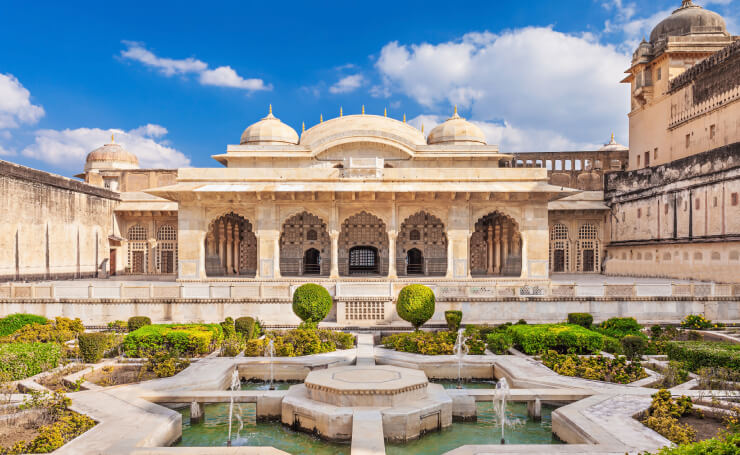Amber Fort and Palace: Overview
Amber Fort is renowned for its splendid architecture, a beautiful blend of Rajput (Hindu) and Mughal styles. Constructed from pale yellow and pink sandstone and white marble, the fort stands proudly on a hill overlooking the scenic Maota Lake.
| Aspect | Detail |
| Location | Amer (Amber), approximately 11 km from Jaipur city center. |
| Primary Builder | Raja Man Singh I (Construction began in 1592). |
| Later Expansions | Completed and expanded upon by successors, notably Mirza Raja Jai Singh I. |
| Historical Role | Served as the capital and stronghold of the Kachwaha Rajput clan before the capital moved to Jaipur in 1727. |
| Key Architectural Style | Fusion of Rajput and Mughal elements. |
| Recognition | UNESCO World Heritage Site (part of the “Hill Forts of Rajasthan”). |
✨ Main Attractions Inside the Palace
The palace complex is divided into four main sections, each with its own courtyard.
| Attraction | Description and Significance |
| Jaleb Chowk | The main courtyard, entered via the Suraj Pol (Sun Gate). It was the parade ground for the army and where spoils of war were displayed. |
| Diwan-e-Aam | The Hall of Public Audience. An impressive hall with a double row of columns and an elevated platform where the king met his public and addressed their concerns. |
| Ganesh Pol | An ornate and beautifully painted gateway leading to the private quarters of the king. It features frescoes and serves as an architectural marvel dedicated to Lord Ganesha. |
| Sheesh Mahal (Mirror Palace) | Located within the Jai Mandir (Hall of Victory), this is the fort’s most dazzling chamber. Its walls and ceilings are entirely covered with thousands of tiny, convex mirrors, designed to shimmer and reflect a single candle’s light to create a starlit effect. |
| Sukh Niwas (Hall of Pleasure) | Situated opposite the Jai Mandir, this hall features an ingenious ancient air-conditioning system. Water-supplied pipes and channels carried cool air over a cascade to cool the room during the hot summer months. |
| Zenana | The secluded women’s quarters surrounding the fourth courtyard. It was designed so the King could visit any of his wives’ rooms without the others knowing. |
| Shila Devi Temple | A temple dedicated to the Goddess Kali, located near the Ganesh Pol. It is known for its intricate silver doors. |
| Maota Lake | The lake at the base of the fort which enhances the palace’s beauty, providing a breathtaking view and historically serving as the main water source. |
💡 Visitor Experience
- Getting There: Visitors can hike, drive a four-wheeler, or take an elephant ride up the steep ascent to the main courtyard (Jaleb Chowk) for a royal experience.
- Evening Show: A spectacular Light and Sound Show is held in the evenings, narrating the history and legends of the fort and the Kachwaha dynasty.
- Connection to Jaigarh Fort: Amber Fort is connected to the formidable Jaigarh Fort (located on the ridge above) by a subterranean tunnel, which was built for the royal family to escape during times of siege.
Would you like to know the current opening hours and ticket prices for the Amber Fort, or explore more historical sites in Jaipur?

